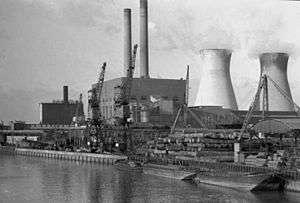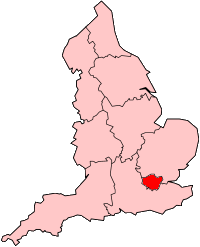West Ham Power Station
| West Ham Power Station | |
|---|---|
 West Ham 'B' Power Station 1974 | |
| Country | England |
| Location | Greater London |
| Coordinates | 51°31′05″N 0°00′05″E / 51.5180°N 0.0014°ECoordinates: 51°31′05″N 0°00′05″E / 51.5180°N 0.0014°E |
| Commission date |
1904 (West Ham A) 1951 (West Ham B) |
| Decommission date | 1983 |
| Operator(s) | Central Electricity Generating Board |
| Thermal power station | |
| Primary fuel | Coal-fired |
| Power generation | |
| Nameplate capacity | 114 MW |
| grid reference TQ388818 | |
West Ham Power Station was a coal-fired power station on Bow Creek (the tidal mouth of the River Lea) at Canning Town, in east London. It was often referred to informally as Canning Town Power Station.
History
The first power station at Canning Town was opened by West Ham Borough Council in 1904, in part to supply the borough's tramways. It replaced an earlier station built in 1898 at Abbey Mills. The station was extended several times between 1904 and 1930, making West Ham one of the largest municipal electricity suppliers in London.[1]
West Ham "A" Power Station used two phase generators as compared with conventional three phase. The local undertaking in West Ham also distributed two phase electricity. In its later life it was connected to the National Grid using Scott connected transformers that converted two phase to three phase electricity.
The station was located off the long-demolished Tucker Street. It was damaged in a bombing raid in September 1940 during the Second World War. The operating of the station was taken over by British Electricity Authority in 1947, who completed a new West Ham 'B' Power Station to the south of the original station in 1951. This had two prominent concrete cooling towers. The A Station used the original wooden cooling towers. As well as burning coal the "B" Station burnt coke blended with coal in its chain grate boilers. The coke was supplied from the adjacent Bromley Gas works. The railway sidings linked to the North London Line at Stephenson Street. Having been taken over by the CEGB in the late 1950s, the B station was closed on 31 October 1983 with a generating capacity of 114 MW.[2] It was subsequently demolished.

References
- ↑ 'West Ham: Local government and public services', A History of the County of Essex: Volume 6 (1973), pp. 96-112. URL: http://www.british-history.ac.uk/report.aspx?compid=42758. Date accessed: 25 November 2007.
- ↑ Mr. Redmond (16 January 1984). WA_281 "Coal-fired Power Stations" Check
|url=value (help). Hansard. Retrieved 1 September 2009.
External links
| Wikimedia Commons has media related to West Ham Power Station. |
- West Ham's Timeline
- Port Cities - Powering the City P8 - 'A' Station boiler house
- Port Cities - Powering the City P5 - cooling ponds and cooling towers
